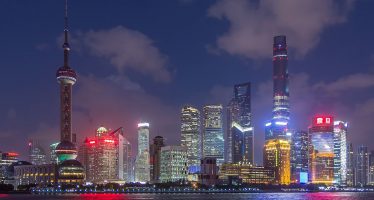Foreign Direct Investments in RSA

Central Johannesburg
By Nataly Marchbank (Senior Manager, International) and Hasinah Essop (Senior Consultant, International Tax) – PricewaterhouseCoopers South Africa
There are many jurisdictions internationally which are popular with multinational groups for the purposes of establishing holding and headquarter companies, for instance Luxembourg, the Netherlands, Switzerland and Singapore. Closer to home, Mauritius has established itself as a favourable jurisdiction for these purposes, especially for investments into African countries.
Until recently, the South African tax and exchange control system has prevented South Africa from being suitable for this purpose. Although one may not necessarily assume that South Africa’s position at the very bottom of the African continent would be an advantage in terms of international business opportunities, it does make the country a very good trans-shipment point between the emerging markets of Central and South America and the newly industrialised nations of South and Far East Asia. South Africa also has world-class infrastructure and is ideally placed for access to countries in the Southern African Customs Union (“SACU”), and the Southern African Development Community (“SADC”), an alliance of 15 countries with a combined population of over 180 million.
In common with almost every business jurisdiction, both on- and offshore, South Africa has hopes of becoming the e-commerce hub of its hemisphere. It seems South Africa has set its sights on attempting to rival the likes of Mauritius in becoming an investment destination of choice for the African continent. The groundwork has now been laid, with the new headquarter company (“HQC”) regime in place. It seems there are some enticing benefits that the HQC regime could offer foreign multinationals, like the readily available wide network of tax treaties and investment protection agreements that South Africa has entered into.
For both international and domestic investors, there are many investment opportunities available in the modern South Africa. The country is the world leader in several specialised manufacturing areas: it produces and exports more gold than any other international competitor, and also exports considerable amounts of coal; and it leads in the field of mineral processing to form ferroalloys and stainless steels. Several other areas, such as tourism, agriculture and livestock development, construction, and the service industry, continue to grow and seem likely to attract substantial foreign investment over the next few years.
In order to promote South Africa as an attractive and suitable holding company and headquarter jurisdiction for investments into, inter alia, the rest of Africa, the HQC regime was introduced by the legislature in 2010. The reason for this newly introduced piece of legislation was that; the South African legislature recognised that there were some barriers when foreign multinationals were directly investing in SA. The obstacles experienced by foreign multinationals were, inter alia, the exposure to South African Controlled Foreign Company (“CFC”) rules; tax on dividends and Transfer pricing issues. The new HQC regime that came into operation for tax years commencing on or after 1 January 2011, seems to have opened some attractive possibilities for foreign direct investments into South Africa and via South Africa.
The newly introduced legislation defines a HQC as a South African resident company that, on meeting three requirements, elects to be treated as an HQC for tax purposes.
Requirement one: Shareholder test
The first of three requirements is that each shareholder must hold at least 10% of the equity shares and voting rights in that company..
Requirement two: Asset test
The second requirement is that at the end of each tax year, 80% or more of the cost of the total assets of the company (excluding cash and demand deposits) must be attributable to (i) any interest in equity shares in; (ii) any amount loaned or advanced to; or (iii) any intellectual property that is licensed by that company to, any foreign company in which the HQC (holds at least 10% of the equity shares and voting rights (referred to hereunder as a “qualifying foreign company”).
Requirement three: Income test
In addition to the above requirements, where the gross income of that company exceeds ZAR5million (approximately GBP400,000) 50% or more of the total receipts and accruals for that tax year must consist of dividends, interest, royalties or fees from a qualifying foreign company; or proceeds from the disposal of any interest in equity shares of a qualifying foreign company or of any intellectual property licensed to such qualifying foreign company.
What are the tax benefits of the HQC regime?
- The foreign subsidiaries of a HQC will not constitute CFCs in relation to the HQC (i.e. their net income would not be attributable to the HQC and taxable in South Africa in the hands of the HQC).
- Dividends declared by a HQC will not be subject to tax on dividends. Profits can hence be repatriated to foreign shareholders without any tax leakage.
- Interest paid on certain financial assistance to a HQC will be exempt from the future interest withholding tax, which will come into operation in 2013.
- Disposals of shares held by a HQC should qualify for an exemption from capital gains tax.
- A HQC may use its functional currency for tax reporting purposes and thus avoid potential tax exposures on currency fluctuations were it required to record its transactions in ZAR for tax purposes.
- Certain financial assistance to a HQC is exempt from thin capitalisation rules, and transfer pricing rules do not apply to financial assistance by a HQC.
- There is no limitation (with regard to thin capitalisation) on the amount of debt funding that is raised for back-to-back loans to its foreign holdings. However, interest deductions will be ring-fenced such that the HQC will only be allowed interest deductions to the extent that it receives interest income. Any excess interest expense shall be carried forward indefinitely.
- Significantly relaxed exchange controls may apply to a HQC, provided certain requirements are met. Exchange control regulations may, in future, exclude HQCs from their ambit.
Disadvantages of the HQC regime
- Any management fee, interest and royalty income of a HQC remains fully taxable in South Africa at 28% but related expenses such as interest on back to back loans are deductible.
- The withholding tax on royalties paid from South Africa to a non-resident will still apply to a HQC. It should, however, be noted that this tax can be reduced to nil in terms of many of SA’s treaties.
South Africa: is it more attractive than Mauritius?
Because of, inter alia, its favourable tax regime, Mauritius is currently the most utilised holding company jurisdiction for investments into Africa by foreign multinationals. The HQC regime was introduced to attract non-residents wanting to establish a launch pad into the rest of Africa and using South Africa as an alternative. The pertinent question is whether South Africa is offering a better regime than Mauritius.
The comparison with Mauritius indicates that South Africa has more tax treaties (approximately 68 in force) and investment protection agreements compared to that of Mauritius, which is a favourable position to be in. However, the following must be considered when comparing the two countries:
- The all or nothing approach in respect of the requirements to qualify as a HQC renders these requirements extremely onerous.
- Items such as interest, royalties, rentals, exchange gains and other forms of income accruing to the HQC are subject to tax at 28% in South Africa, while Mauritius offers an effective 3% rate.
- South Africa levies capital gains tax while Mauritius limits the circumstances in which capital gains tax applies.
Conclusion:
It would appear that the government is serious about making South Africa attractive to investors into Africa while being conscious of its position as a member of the G20 and of the views of the OECD. National Treasury has done well to devise a HQC tax regime that reflects a careful balance between providing a facility for the free flow of capital to and from target investments and creating a tax regime that will not be accused of being a harmful tax practice.Bearing in mind South Africa’s other advantages as a launch pad to Africa, its offers the following:
- Most modern city of all the other African countries;
- It has sophisticated banking, accounting and legal systems in place;
- An ease of communications as there are no language barriers in South Africa since nearly everybody speaks English;
- Wide range of entertainment on offer that is world-class and renowned;
- Wide range of sport on offer such as golf; cricket and rugby;
- One of the best places in the world for viewing African wildlife;
- Offers a unique mix of culture and beautiful landscapes;
- With frequent, direct flights now available, it is easier than ever to get to South Africa;
- South Africa has an incredible biodiversity; and
- South Africa has a great climate all year round.
The new tax regime combined with the attributes listed above alongside South Africa’s extensive tax treaty network, makes South Africa a very attractive place for establishing regional headquarters.
You may have an interest in also reading…
China on the Way Back to Rebalancing
China’s economy keeps recovering from the coronavirus pandemic-led crisis through the third quarter of 2020, as revealed by the numbers
Ernst & Young, Argentina: Tax Reform Affects Stocks and Dividends
On September 23 of last year a law (nr. 26,893) was introduced which significantly amend the Argentine income tax law.
Otaviano Canuto, IMF: Whither Emerging Markets Foreign Exchange Reserves
After a exponential rise in foreign exchange reserves accumulation by emerging markets from 2000 onwards, the tide seems to have


















































































